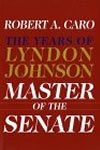Master of the Senate
by Robert A. Caro
In today's American political world, with its executive incompetence and superficial Congressional posturing, it's hard to recall how bad politics were in the very recent past. This volume, part of Caro's monumental biography of Lyndon Johnson, reminds us how impossibly backward the nation's political life once was, and what strange men (and they were almost all men) once dominated it.
Johnson was difficult, dangerous, and bigoted. Cruel to his rivals and unkind to his allies, he seemed to make a point of seeking out the insecurities and weaknesses of his staff for the pure joy of making them ever more miserable. He forced blushing secretaries take dictation while he sat on the toilet, he made devoted family men work unceasingly, and in a city not then noted for feminism his unconcealed contempt for his wife Lady Bird shocked his colleagues (and their wives). He ruined good men in order that his wealthy contributors could make a few extra dollars. He was a red-baiter and a toady.
But yet, when no one had been able to pass a civil rights bill despite decades of effort, in an era in which the South was entirely segregated and expected to remain forever segregated, Johnson passed the bills that changed everything.
It's hard, now, to realize how incoherent the Democratic party was before Johnson, or how completely the protection of segregation in the South had come to dominate US politics. Half the party was blindly reactionary, and that was the powerful half. The liberal Democrats -- what we would otherwise call the 'real' Democrats -- were a powerless rump. LBJ kept them powerless until he needed them, and then -- when he needed them -- he did the right thing, a thing that very much needed to be done.
Caro's vast biography, of which this is the third installment, is not concise. Like Johnson, some parts of this long book are insufferable. But Caro takes the space and time to tell you everything, and everyone is here: the young Hubert Humphrey, the old Richard Brevard Russell, from Martin Luther King, Jr. to Leland Olds.
Once Roe goes, American politics may well return to this strange era in which strong, stable, but fractious minorities fight so desperately that nothing at all can be done about anything. Whether we look to LBJ as a caution or as a way out, he'll grown even more interesting.
